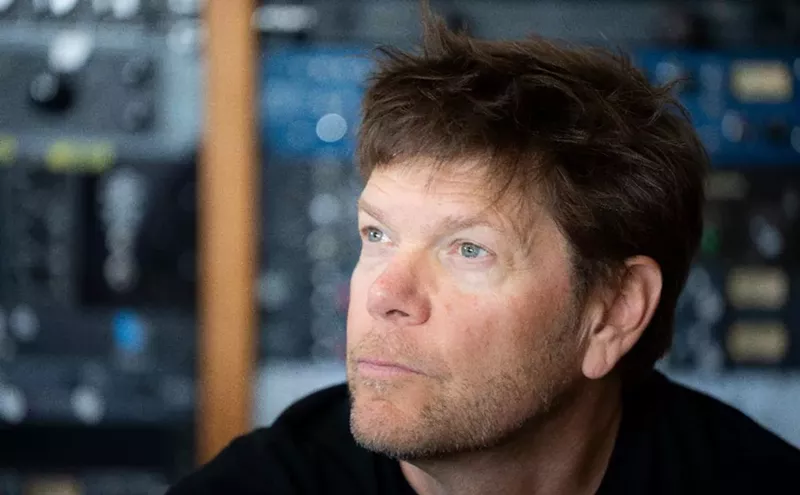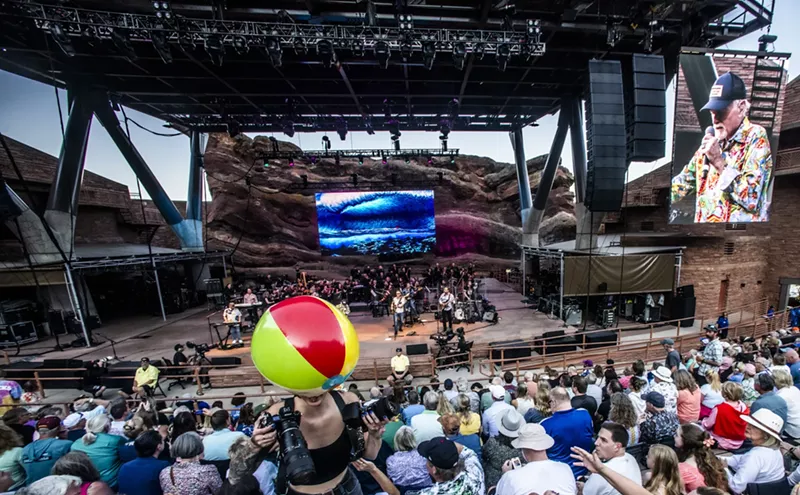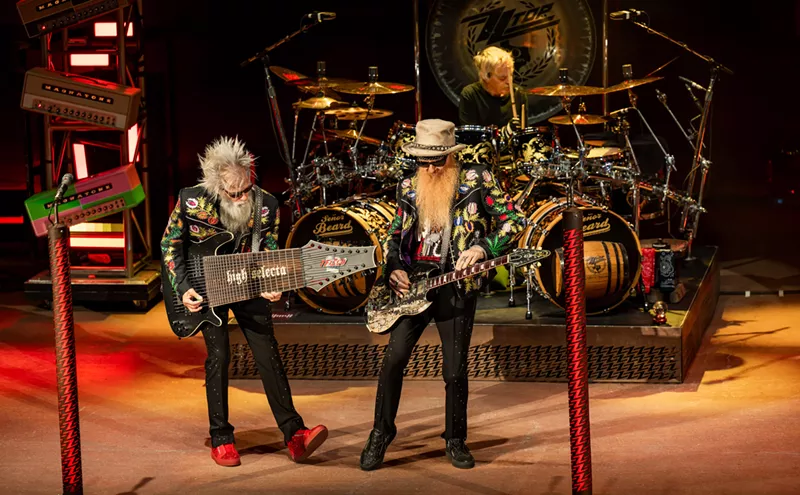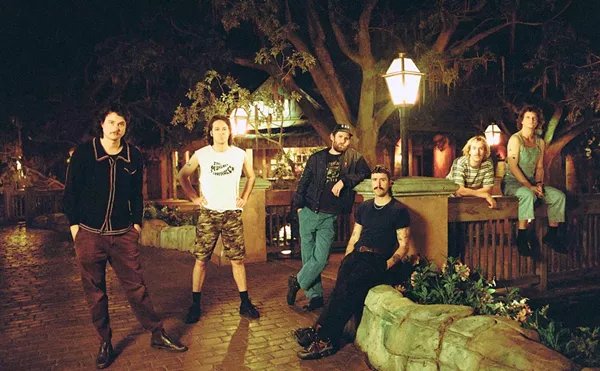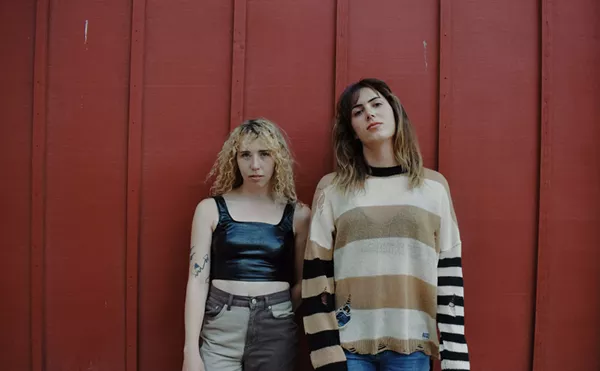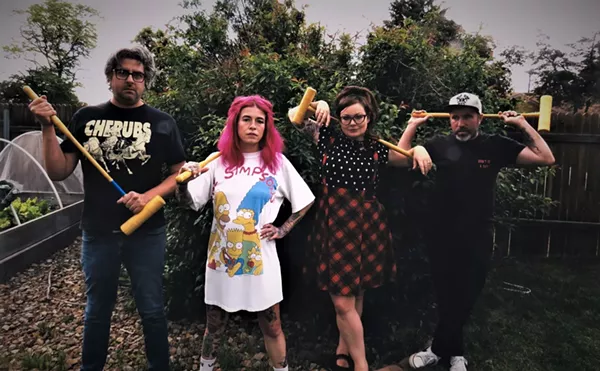By the time of Dntel's debut full-length, 2001's Life Is Full of Possibilities, Tamborello had established enough friendships in the national underground music circuit that Gibbard of then-less-famous Death Cab for Cutie and Brian McMahon of Slint and The For Carnation were two of the handful of collaborators on that record.
Gibbard, of course, went on to start the Postal Service with Tamborello a year later, and the duo released its sole album so far, 2003's Give Up. We spoke to Tamborello before one of his rare Dntel tours about how he got started, his tools for making music and his brief stint as a talent scout for Virgin Records.
Westword: You started making electronic music at a young age. What inspired you to make that kind of music in the late '80s, and what kind of gear did you use? What was your early music like?
Jimmy Tamborello:I guess techno pop was a big influence early on -- New Order, Depeche Mode, Pet Shop Boys, that kind of stuff. When I took piano lessons as a kid, I remember I had the sheet music for "West End Girls," by Pet Shop Boys. Maybe in junior high, me and my friends started making up bands and making up music. My dad had a little home studio because he played saxophone and made his own music. He had like a Roland D50 keyboard and a little sequencer and stuff. So it was like a mini-electronics studio. That's what we had to use to make music.
The really early stuff was trying to be techno pop, but then we got really into more industrial music pretty early on. Industrial, dark, angst-ridden, even though we weren't very angst-ridden. More to the Skinny Puppy side, I guess.
Did you play your early music for people, and can you think of a turning point where you realized you wanted to and could do more with the music you were creating as a younger person?
Almost from the beginning, we used to send our music to this one radio DJ who would play it on the radio every once in a while. We also sent it to local papers and stuff. So right away, part of the game was trying to get people talking about it or playing it. We also sent stuff to college radio. So I feel like that's been part of the fun since the beginning.
When people write about your music, they often refer to it as "glitch" or "IDM." Do you identify your work with either term?
I guess I do, especially early on. You can definitely hear the glitch influence on all the early stuff. I feel like every song I made had some sort of distortion to it or something broken-sounding in it. I listened to a lot of that stuff at the time, too, the early Warp stuff, like Autechre and Oval.
What kind of software or equipment did you use before Logic Pro came along, and what does Logic allow you to do that you weren't able to before you started using it?
When I first got a keyboard, it had a built-in sequencer, and I wasn't using a computer. Eventually I used Vision for a long time. I think it's totally gone now. With that stuff, I couldn't record. Also, because of the computer I was using, I could never record audio. I could just use them as sequencers. Right before I did Life Is Full of Possibilities was when I finally had a computer to record audio into. That was the first time I could really use vocals.
Is there a reason you use Logic over Ableton?
Oh, I used Cubase forever after Vision. Just recently, in the last couple of years, I got a new computer, a new Mac that I felt Logic could take advantage of the computer a little bit better, so I switched. I had a lot of friends using it too, and it seemed like a good time to switch. I do use [Ableton] Live a little bit, too, mostly live. So I can see the advantages of using that in the studio, too. Logic is just closer to what I've always been used to using.
How did you meet and come to work with Brian McMahon?
We met because I tried out for The For Carnation to play bass. A friend of mine was in the band and recommended me. So I went to a couple of practices to try out, and then I panicked and took myself out of the running because I didn't think I could do it. But then a little while later, he got back in touch -- I think he had moved to L.A. -- and we started hanging out.
Are there other electronic artists you find especially interesting and/or inspiring, and if so, what is it about their work do you most appreciate?
There's always someone new that's doing something exciting. For a long time, it was Ricardo Villalobos. I felt like everything he was putting out was really exciting and new to me. But it's been a little while since I've heard much from him. I really like Matthew Davis, who I've known for a while, and I think his stuff is really inspiring. I really like Pearson Sound and Ramadan Man. Maybe it's not a specific technique that I learn [from them], but it makes me excited to work on music when I hear something that seems new to me.
For playing live shows, do you add other elements into the performance other than the music, and do you find you have to modify how you play the music live? If so, what and why, and if not, why not?
I just started using a new controller that's going to make it feel a lot more live than it has in the past. And I'm doing some visuals, too, that I've been working on, just some stop-motion animation with construction paper with some Final Cut [Pro] effects put on them. A lot of kaleidoscope stuff. It's going to be really homemade.
Do you plan on projecting those images on to you or on a screen?
It's going to depend on the club. A lot of clubs have systems. I'm bringing a projector, but I'm not bringing a screen because we already have a really full van. If it makes sense, we'll do it, and if not...The show doesn't depend on the visuals -- that's extra.
Are you playing with anyone else on this tour?
I'm touring with two other bands, and we're all going together: One AM Radio and Deotic. The singer from One AM Radio will sing a couple of songs with me, and I'm hoping as the tour goes on, I'll get some of them to play some instruments on some songs and stuff, but we haven't been rehearsing them that way, so it'll mostly just be me.
Do you still use a MicroKorg in the studio? What is it about that piece of machinery that you like, and what do you find most useful about it in your studio work?
I use it still. I haven't actually used it on the recordings for a little while. I go through phases where I like certain keyboards the most. That one is really convenient and easy to edit the sounds. For a while, it was an easy one to go to. I use it more for live stuff or for improvising more than when I'm actually working on a song in the studio.
Before music became your career, what kinds of jobs did you have? What was the best of them and what was the worst?
I've only had a few jobs before I started doing music. I had parents that helped me through college. I had one job for a couple of years doing -- I don't know what you'd call it -- copy editing for a job search website. It was very office-y and talking to people on the phone, which I didn't like. I don't really have any good stories about good or bad jobs.
Oh, I forgot! I did talent scouting for Virgin Records for a couple of years right before Postal Service went on tour. That was an interesting job. It forced me to go out a lot of nights, which was different for me. I went to see a lot of bands I wouldn't see normally. I got to see some weird showcases. There was one where an all girl-group, this pop group, it was a showcase that was just for me. I sat on the couch in a rehearsal space, and they performed for me. It was really uncomfortable. [laughs] I was the lowest you could get on the totem pole there, and I think when I showed up at that thing, they were really sad that the record label sent me.
Dntel, One AM Radio and Geotic, 8 p.m., Tuesday, August 9, hi-dive, $12, 720-570-4500, 18+.
Follow Backbeat @westword_music and facebook.com/westwordmusic



